Afghanistan War, CIA Sponsored Terror, Civil Liberties, Criminalizing Dissent, Gaza, Guantanamo, Habeas Corpus, Human Rights, Iraq War, NSA Spying, Political Prisoner, Prison Industry, Surveillance, Targeting Muslims, Torture, Truth to Power, War Resister
Podcast: Play in new window | Download
Updates:
- Mumia Spurs Bill To Block Publicity-Seeking Criminals (Son of Sam Law)
- Guantanamo Bay Prisoner Files Historic Lawsuit Against Obama Over Force-Feeding
——
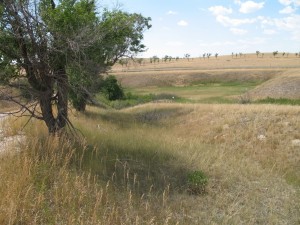
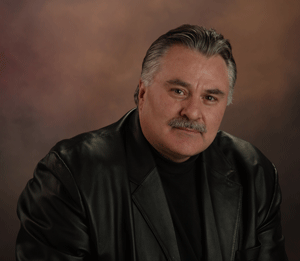
Lawyers You’ll Like – Charlie Abourezk
As part of our Lawyers You’ll Like series, we talk with attorney Charles Abourezk about his work with the Native American community in South Dakota. Charles is a trial attorney, author and film maker. His documentary A Tattoo On My Heart: The Warriors of Wounded Knee 1973 is a gripping documentation of those American Indian men and women involved in the siege. Charles is the Chief Justice of the Rosebud Sioux Tribe Supreme Court, he’s also member of South Dakota Advisory Committee to U.S. Commission on Civil Rights. He’s the son of James George Abourezk, former Democratic United States Representative and United States Senator where he was generally viewed as critical of US foreign policy in Israel and Palestinian.
Attorney Charlie Abourezk:
- The Rosebud Sioux Tribe is the second largest tribe in South Dakota. There are nine total tribal governments in the state. It’s where I grew up.
- I spent most of my adult life on the Pine Ridge Reservation which has been the poorest county in the United States.
- I went to law school, long after I worked for a number of Indian organizations including a Native American NGO that worked at the UN in Category 2 status.
- The Pine Ridge Reservation is the second largest reservation in the United States, located in south western South Dakota. It’s a huge land mass, takes about an hour and a half to drive diagonally across the reservation. There’s very little economy. The geography is very poor, it lends itself to cattle grazing but not much in terms of raising crops.
- Wounded Knee was the site of the 1890 massacre in which almost 300 American Indians from several different tribes were killed by the U.S. Army. They were surrounded and essentially murdered on that spot.
- So, in 1973, there had been a lot of racial discrimination and racially motivated killings of Indian people, the American Indian Movement returned and joined forces with the traditional people who had long been neglected on the reservation.
- As a result they decided to engage in a protest. They chose the site of the massacre at Wounded Knee, to stage that protest.
- They set up sort of a line there, with the government and US Marshalls, along with Dick Wilson’s followers who were armed and were called the goon squad and formed the other side of that line. The siege lasted 71 days.
- It finally dismantled and number of people were prosecuted as a result of that.
- At Wounded Knee, two Indian people killed and one Marshall wounded.
- We set up a recording studio right at the Wounded Knee school, and just took people’s stories. I did the interviews, they were really powerful. There were some stories that didn’t fit with the arc of the film but were incredible. I’m glad I documented it then, because I think of the people in the documentary, 7 or 8 have now passed away.
- I continue to be a strong advocate for tribal sovereignty, self determination and the rights of individuals especially within the dynamic of racial discrimination which at times in South Dakota have been as bad as the south is toward African Americans.
- I helped affirm and preserve the boundaries of the Yankton Sioux Reservation, that went up to the Supreme Court twice. I was the lead council when it finally concluded, we were able to win that one.
- I was a former Supreme Court Justice on the Pine Ridge Reservation for their Supreme Court and I retired from that position.
- Except for limited jurisdiction the Federal Government had on criminal matters, the civil jurisdiction for incidents which occur within the reservation lie with the tribal court as do criminal misdemeanors for tribal members and non tribal members meaning Indians from other tribes that happen to be living on the reservation.
- In the Native American view you can’t really have winners and losers, you have to try to restore the harmony or the balance within the tribe.
- The American government adopted the British style of colonialism as did the Israelis when they began to colonize parts of Palestine. It kind of goes in 4 steps.
- A disruption of traditional agriculture and food gathering, which out here was done in two ways, killing off the buffalo and secondly constraining them from moving around in a wide arc for hunting and gathering – by putting them on the reservation they stopped that.
- Transfer commonly owned land into private ownership, to turn land into a commodity that can be bought and sold. They did that through what’s called the Daws Act or the Allotment Act in the late 1800s.
- Theodore Roosevelt called that act a “might pulverizing machine” with which to break up the tribal mass.
- The third step was to develop a native ruling elite. In this case they first developed “paper chiefs” then in the 1930s developed modern tribal government.
- Last step, develop an educated elite. Of course any colonizer anywhere, that’s the step that always back fires.
- The American Indian Movement was born from the children of the parents who were relocated into cities trained as workers.
- They were the ones who came back home and joined forces with the traditional people and stood up against racism and in favor of tribal sovereignty and tribal self determination.
- You see many parallels with that and what’s happening to the Palestinians in the West Bank and Gaza. Dr William Julius Wilson
Guest – Charlie Abourezk, from Rapid City, South Dakota and is a trial attorney, longtime activist and community organizer in the native American community in South Dakota. He is also a documentary film maker, his most recent is the feature length documentary “A Tattoo On My Heart: The Warriors of Wounded Knee 1973” which played on public television stations around the United States. He is the current Chief Justice of the Rosebud Sioux Tribe’s Supreme Court and a member of the South Dakota Advisory Committee to the US Commission on Civil Rights. His client base is made up largely of Native Americans, tribal schools and Indian tribal governments, but he also represents plaintiffs in civil rights litigation. He will have a book coming out this next year entitled “A Mighty Pulverizing Machine: The Continuing Colonization of American Indians.”
——-
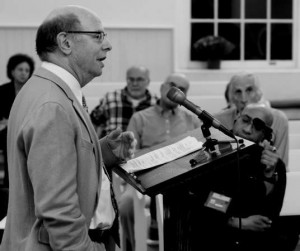
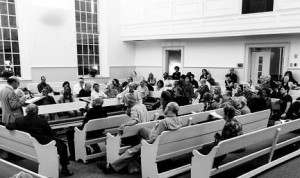
From Guantanamo to Wikileaks: Taking on the State In a Post 9/11 World.
Our own Michael Ratner, President Emeritus, Center for Constitutional Rights (CCR), past president, National Lawyers Guild; Chair, European Center for Constitutional and Human Rights delivered a talk last week titled ‘From Guantanamo to Wikileaks: Taking on the State In a Post 9/11 World.’ Michael was honored with a PathMaker to Peace Award by the Brooklyn For Peace Organization for his consistent work in litigation against government spying and surveillance of activists including the targeting of Muslims particularly after 9/11.
Law and Disorder Co-host Attorney Michael Ratner, President Emeritus of the Center for Constitutional Rights (CCR), a non-profit human rights litigation organization based in New York City and president of the European Center for Constitutional and Human Rights (ECCHR) based in Berlin. Ratner and CCR are currently the attorneys in the United States for publishers Julian Assange and Wikileaks. He was co-counsel in representing the Guantanamo Bay detainees in the United States Supreme Court, where, in June 2004, the court decided his clients have the right to test the legality of their detentions in court. Ratner is also a past president of the National Lawyers Guild and the author of numerous books and articles, including the books Who Killed Che? How the CIA Got Away With Murder, The Trial of Donald Rumsfeld: A Prosecution by Book, Against War with Iraq and Guantanamo: What the World Should Know, as well as a textbook on international human rights.
———————————————————————————-

Please help support Law and Disorder, the show is now a sponsored project of Fractured Atlas, a non-profit arts service organization. Contributions for the charitable purposes of Law and Disorder must be made payable to Fractured Atlas only and are tax-deductible to the extent permitted by law.
CIA Sponsored Terror, Civil Liberties, Criminalizing Dissent, Gaza, Guantanamo, Habeas Corpus, Human Rights, Military Tribunal, NSA Spying, Political Prisoner, Prosecution of the Bush Administration, Supreme Court, Surveillance, Targeting Muslims, Torture, War Resister
Podcast: Play in new window | Download
Updates:
- Michael Ratner: Moazzam Begg Freed After Terrorism Charges Dropped
- Michael Ratner: 149 Inmates In Guantanamo Bay Prison – 79 Approved For Transfer
——-
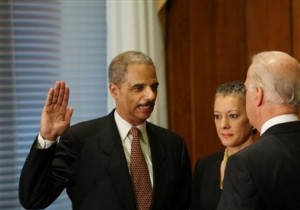

U.S. Attorney General Eric Holder Evaluation
Michael Ratner and Heidi Boghosian draw a balance sheet on the record of U.S. Attorney General Eric Holder.
- Holder approved drone killing of American citizen al-Awlaki without due process.
- Holder failed to prosecute any of the Bush Administration officials who were openly admitted torturers.
- Holder abrogated the responsibility in holding corporate criminals accountable. Wall Street.
- Holder settled with HSBC for 2 billion, the bank was caught laundering money for drug cartels yet no prosecution.
- With-Holder prosecuted whistleblowers, Chelsea Manning, Julian Assange, Edward Snowden, James Risen, Jeremy Hammond, Fox News Reporter,
Law and Disorder Co-host Attorney Heidi Boghosian, executive director of the A.J. Muste Memorial Institute, a nonprofit charitable foundation providing support to the nonviolent movement for social change. Before that she was executive director of the National Lawyers Guild. She is author of the book “Spying on Democracy: Government Surveillance, Corporate Power, and Public Resistance” (City Lights, 2013) as well as several reports on policing and the First Amendment.
Law and Disorder Co-host Attorney Michael Ratner, President Emeritus of the Center for Constitutional Rights (CCR), a non-profit human rights litigation organization based in New York City and president of the European Center for Constitutional and Human Rights (ECCHR) based in Berlin. Ratner and CCR are currently the attorneys in the United States for publishers Julian Assange and Wikileaks. He was co-counsel in representing the Guantanamo Bay detainees in the United States Supreme Court, where, in June 2004, the court decided his clients have the right to test the legality of their detentions in court. Ratner is also a past president of the National Lawyers Guild and the author of numerous books and articles, including the books Who Killed Che? How the CIA Got Away With Murder, The Trial of Donald Rumsfeld: A Prosecution by Book, Against War with Iraq and Guantanamo: What the World Should Know, as well as a textbook on international human rights.
——-
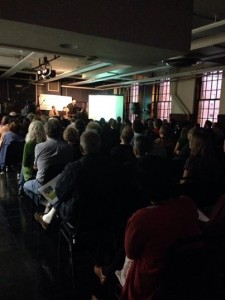

Academic Freedom & Political Dissent: A Conversation with Katherine Franke and the Community
We continue to report on Professor Steven Salaita’s case and the concerns regarding established principles of academic freedom. We hear a presentation by Katherine Franke, Professor of Law at Columbia University. Listeners may recall that Professor Salaita was unhired from the American Indian Studies program at the University of Illinois at Urbana-Champaign because of his statements on social media criticizing Israel’s conduct of military operations in Gaza. We reported last month on Law and Disorder that scholars from law schools around the country came out with a letter condemning the decision of the University of Illinois to unhire Professor Salaita. Katherine Franke discussed Salaita’s case at the University of Illinois at Urbana-Champaign late last month.
Speaker – Katherine Franke, Isidor and Seville Sulzbacher Professor of Law; Director, Center for Gender and Sexuality Law at Columbia University. She was awarded a 2011 Guggenheim Fellowship, and is among the nation’s leading scholars in the area of feminism, sexuality and race. In addition to her scholarly writing on sexual harassment, gender equality, sexual rights, and racial history, she writes regularly for a more popular audience in the Gender and Sexuality Law Blog. Franke is also on the Executive Committee for Columbia’s Institute for Research on Women and Gender, and the Center for Palestine Studies and teaches at a medium security women’s prison in Manhattan. Her legal career began as a civil rights lawyer, first specializing in HIV discrimination cases and then race and sex cases more generally. In the last 25 years she has authored briefs in cases addressing HIV discrimination, forced sterilization, same-sex sexual harassment, gender stereotyping, and transgender discrimination in the Supreme Court and other lower courts.
—————————————————————-

Please help support Law and Disorder, the show is now a sponsored project of Fractured Atlas, a non-profit arts service organization. Contributions for the charitable purposes of Law and Disorder must be made payable to Fractured Atlas only and are tax-deductible to the extent permitted by law.
Afghanistan War, CIA Sponsored Terror, Civil Liberties, Criminalizing Dissent, Gaza, Human Rights, Iraq War, NSA Spying, Prison Industry, Surveillance, Targeting Muslims, Truth to Power, War Resister
Podcast: Play in new window | Download
Updates:
——–

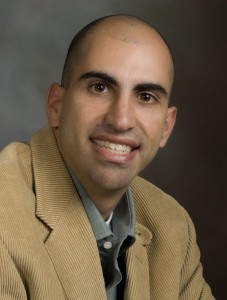
University of Illinois Chancellor Wise Going Forward With Salaita Appointment To Board of Trustees Vote
Last month, the University of Illinois rescinded the job offer of Professor Steven Salaita who wrote controversial social media posts about the war in Gaza. This raised serious concerns under established principles of academic freedom. Professor Salaita was basically dehired from the American Indian Studies program at the University of Illinois at Urbana-Champaign because of his statements on social media criticizing Israel’s conduct of military operations in Gaza. We reported weeks ago on Law and Disorder that scholars from law schools around the country came out with a very strong letter condemning the decision of the University of Illinois to dehire Professor Salaita. FOIA Email Link
Professor Katherine Franke:
- Professor Steven Salaita until recently was a tenured professor at Virgina Tech and was well known in English departments across the country and also among scholars who worked in colonialism and post colonialism studies. He developed a really rich body of work thinking about Native American rights, native people’s rights in the United States and connecting them to Palestinian rights in particular internationally.
- Read Professor Katherine Franke’s second letter here.
- He was a well sought after scholar and was hired by the University of Illinois in their American Indian Studies program in a process that started last fall.
- The department unanimously voted him an offer and this summer the university started to get pressure from outside donors, some of their alums and advocacy groups to not finalize the offer because of some tweets Professor Salaita sent out over the summer related to the Israeli attacks in Gaza.
- The emails to the chancellor were released showing that large six figure donors had seen those tweets or learned of them and said you cannot hire this guy or I will withdraw my future giving to the universities.
- So, the chancellor let Steven know that she was not going to finalize his offer even though they already negotiated his teaching schedule, he’s already rented an apartment, they had already negotiated his moving expenses.
- Right now he has no job, no income, no where to live.
- It’s the most recent iteration of what has been a rather well organized, well financed campaign in the United States in particular to purge the academy of scholars and even graduate students who are doing work that is either sympathetic to the idea of Palestinian sovereignty or rights or critical of Israeli state policy particularly the occupation.
- It was so obviously a violation of the fundamental right of academic freedom.
- I’ve only learned of his scholarship as a result of this campaign and his termination from the University of Illinois.
- I explain to Chancellor Wise in the letter that I sent, that not only will I not come to the university to speak in an official capacity but I will come to Urbana-Champaign and meet off campus with faculty and students, and members of the communities about these issues of academic freedom.
- Their strategy has been to portray any criticism of Israeli state policy or any criticism of political Zionism as uncivil or as a form of hate speech, but more importantly to appeal to a civility norm. That its not nice. That it creates an unwelcome learning environment for students, particularly jewish students.
- To see her parroting that language (Chancellor Wise) and for Chris Kennedy to parrot that language says to me that they’ve been reached by these organized operatives from the outside about how to message this termination.
- I don’t believe there is a civility norm at stake here and I think we actually shouldn’t have one in a university setting. We ought to take on uncivil ideas, ideas that are troubling, that are uncomfortable and unpack them in thoughtful scholarly ways.
- As these emails are coming out under the Freedom of Information Act Requests over the last few days its quite clear that civility is not what underwrote the decision to terminate him. It was really outside pressure from donors.
Guest – Katherine Franke, Isidor and Seville Sulzbacher Professor of Law; Director, Center for Gender and Sexuality Law at Columbia University. She was awarded a 2011 Guggenheim Fellowship, and is among the nation’s leading scholars in the area of feminism, sexuality and race. In addition to her scholarly writing on sexual harassment, gender equality, sexual rights, and racial history, she writes regularly for a more popular audience in the Gender and Sexuality Law Blog. Franke is also on the Executive Committee for Columbia’s Institute for Research on Women and Gender, and the Center for Palestine Studies and teaches at a medium security women’s prison in Manhattan. Her legal career began as a civil rights lawyer, first specializing in HIV discrimination cases and then race and sex cases more generally. In the last 25 years she has authored briefs in cases addressing HIV discrimination, forced sterilization, same-sex sexual harassment, gender stereotyping, and transgender discrimination in the Supreme Court and other lower courts.
———-
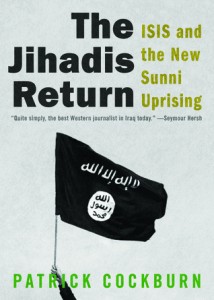
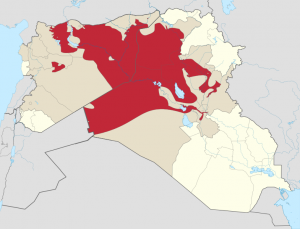
The Jihadis Return: ISIS and the New Sunni Uprising
In June of this year, the United States sent more troops to Iraq and carried out airstrikes to stop the advance of the Islamic State of Iraq and the Levant, known as ISIS into the Kurdish capitol Erbil. However, a more complicated situation has developed in Syria. The U.S., Western European, Saudi, and Arab Gulf policy is to overthrow Syrian President Bashar al-Assad, which is also the goal of ISIS and other jihadis in Syria. ISIS’s membership is between 10 and 17 thousand. We talk today with veteran Middle East correspondent Patrick Cockburn about his new book The Jihadis Return: ISIS and the New Sunni Uprising, about the origins of ISIS. We’ll also talk about the role of Saudi Arabia in the larger picture and in funding part of the Sunni terrorist groups, which was exposed by Wikileaks.
Patrick Cockburn:
- The Islamic State of Iraq and the Levant, which has turned into the new caliphate in western-northern Iraq and western Syria. It has come out of Al-Qaeda in Iraq.
- This organization that was linked to Al-Qaeda but not formed by Al-Qaeda after the invasion of Iraq in 2003 is very anti-Shia, Sunni fundamentalist is extremely violent.
- What makes it so effective is its a mixture of religious fanaticism and military efficiency.
- Some of the senior people of ISIS are former security officers and special republican guard officers from Saddam Hussein’s time.
- ISIS is led by a core of people who fought the U.S. in Iraq, fought the Iraqi Army, this is after 2003 and then after 2011 fought in Syria.
- So, it’s quite an experienced group.
- It had been growing stronger in Iraq over the last 3 years. It launched a series of campaigns, one of which to break its members out of prison.
- It had taken over quite big territory in Iraq then it had moved into Syria.
- It’s present in both countries, but its main effort was in Iraq this year.
- It always had strength in Mosul City, even though the Iraqi Army was in theoretically in charge but it would still levy protection money on people.
- Maybe 8 million dollars a month. I know contract men there paying half a million dollars a month.
- It’s final take over was swift and devastating. I can’t think of an example in history when 350 thousand men in the Iraqi Army, 650 thousand police simply disintegrated under an attack from under 3000 ISIS fighters.
- What really changed in 2011 when you had the uprising in Syria, primarily the Sunni Arabs of Syria, Iraq politicians said it would spill over into Iraq.
- The U.S. and its allies to a substantial degree were responsible for this. They backed the uprising against Assad. Even when it was apparent in the last 2 years that Assad wasn’t going to go.
- Wahhabism is the Islamic variant practiced in Saudi Arabia.
- There’s always been an alliance over the last 300 years between the preachers of this very puritanical, fanatical, violent and bigoted variant of Islam and the House of Saud.
- What they believe is not that much different from what ISIS believes. It’s very anti-Shia, the Shia seen as heretics worthy of death. It’s anti-Christian, anti-Jewish and deeply intolerant.
- Without the policies of Saudi Arabia and Pakistan, there wouldn’t have been a 911.
- Bin Laden was part of the a Saudi elite.
- Rather amazingly, the Saudis were let off scott-free.
- Kuwait has been a major financial supporter of the Jihadis, so has UAE, so has Qatar, the gulf monarchies as a whole if you like and so has Turkey.
- The problem with Obama and the U.S. is they have to decide what side they’re on. In Iraq, they’re supporting the government against ISIS, they’re supporting the Kurds against ISIS.
- But in Syria, the main opponent of ISIS is the Assad government but the U.S. policy is to weaken and displace that government.
- In a way, (the U.S. policy actually assists ISIS)
Guest – Patrick Cockburn is currently Middle East correspondent for The Independent and worked previously for the Financial Times. He has written three books on Iraq’s recent history as well as a memoir, The Broken Boy and, with his son, a book on schizophrenia, Henry’s Demons, which was shortlisted for a Costa Award. He won the Martha Gellhorn Prize in 2005, the James Cameron Prize in 2006, and the Orwell Prize for Journalism in 2009.
————————————————————

Please help support Law and Disorder, the show is now a sponsored project of Fractured Atlas, a non-profit arts service organization. Contributions for the charitable purposes of Law and Disorder must be made payable to Fractured Atlas only and are tax-deductible to the extent permitted by law.
CIA Sponsored Terror, Criminalizing Dissent, Gaza, Habeas Corpus, Human Rights, NSA Spying, Political Prisoner, Surveillance, Targeting Muslims, Truth to Power, War Resister
Podcast: Play in new window | Download
Updates:
- Michael Ratner: The Dahiya Doctrine, Wikileaks and Julian Assange
- Michael Ratner: U.S. Is The Fundamental Supporter Of Israel War Crimes
- Major Free Speech Court Victory in Brooklyn Bridge Occupy Mass Arrest Class Action
- Update On H.Rap Brown Health And Treatment
——
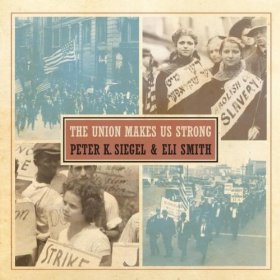
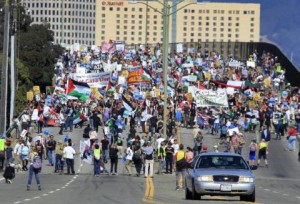
Labor Day Songs From The Union Makes Us Strong.
Michael Smith and Heidi Boghosian play songs from The Union Makes Us Strong album by Peter Siegel and Eli Smith to honor Labor Day 2014. The historical importance of these songs lie in the role they played in the creation of the union movement in the United States in the first half of the 20th century. They instrumental in propagating the attitudes and ideas the “class consciousness” that led working men and women by the thousands to recognize the need to stand together in solidarity. In short, they shaped a politicized working-class culture based more upon social than individual values.
Songs: There Is Power In the Union / The Preacher And The Slave / The Death of Mother Jones / Song For Bridges.
——
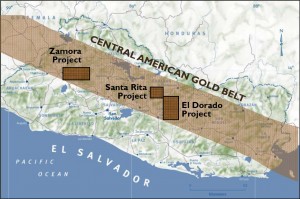
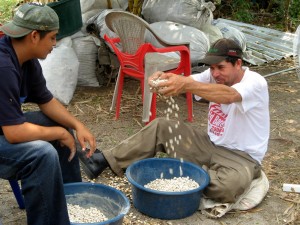
Non-GMO Seed Programs Help Poor Farmers In El Salvador Secede From Monsanto Monopoly
When you hear news reports about the mass migration of unaccompanied children coming across the Mexico – U.S. border, you usually don’t hear about the pressures that are driving the emigration. Today we look at some of the economic and agricultural reasons that cause migrations specifically in El Salvador. One organization helps poor farmers grow and market sees for corn and beans. This program is called the Mangrove Association where the government buys the seeds and distributes them for free to the 400 thousand farmers. However, these are non – GMO seeds, a preference that local communities and the El Salvadoran government had to fight for.
Professor of Law Eleanor Stein:
- My primary work over the last 10 years has been centered on climate change and what can be done to reverse that trend and to change the political climate in which those decisions get made.
- I was interested in this project in El Salvador because I understood that it was based in some local community groups in a very poverty stricken rural area in the southwestern part of the country and they were using very creative methods to develop more of a sustainable agriculture and also to take measures related to adaptation of their region as a result of climate change.
- CAFTA is a trade treaty which the U.S. and Central America are parties and the Dominican Republic and it governs very much like NAFTA. It governs the requirement for procurement of goods and services by governments in those regions.
- El Salvador is a very poor country. It’s still living with the results of a civil war that went from 1979 to 1992 that resulted in the death of almost 80 thousand people.
- When I say a civil war, that doesn’t really capture the full involvement of the U.S. government fully supporting the right wing counter insurgency forces.
- They (Salvadoran government) have put in place a seed program that began in 2012 that was meant to deal with tremendous problems in food insecurity, agricultural non-sustainability and poverty and lack of economic opportunity that exist in the rural areas.
- They’re cooperatives that produce seeds. They’re locally grown, they’re non-GMO and they are apparently more successful than the Monsanto varieties.
- They have a higher germination rate, and they’re much more hardy in their conditions of growth in El Salvador.
- Until fairly recently, Monsanto had been procuring almost all of its seeds from a Monsanto subsidiary in the region and from very few other producers and were arguable in violation of CAFTA because this was a direct procurement without bidding.
- The Millennial Challenge Corporation is a U.S. government agency which is basically a dispenser of aid in the form of grants to countries that have been defined as emerging potential democracies by the State Department.
- This aid package for every country it has been offered has been conditioned on the local government making certain changes. Legislative changes to bring the economy of the recipient country more in line with the neo-liberal trade policies.
- For example, they tried to get the El Salvadoran legislature to privatize water in their country.
- This is one of few places in the world where a region has been able to secede from the Monsanto monopoly.
- Mangrove Association.There were able to provide for free to more than 400 thousand farmers these very high quality seeds. This is a concrete effective local program that is really combating hunger and food insecurity and its at a time when tens of thousands of children from El Salvador are trying to emigrate to the United States because of not only violence but poverty and lack of opportunity in El Salvador.
- Both the violence and the poverty and the lack of economic development are rooted in the war in the history of El Salvador and the history of the U.S. role in that war.
- I think the underlying condition not only for the emigration but for the violence itself is the lack of infrastructure, the lack of development, the lack of opportunity that continues to haunt this country that was under the rule of an oligarchy for 60 or 70 years.
- We didn’t meet a single family that had indoor plumbing. People are living under really difficult conditions.
- www.eco-viva.org
Guest – Eleanor Stein, teaches a course called the Law of Climate Change: Domestic and Transnational at Albany Law School and SUNY Albany, in conjunction with the Environmental and Atmospheric Sciences Department at SUNY. Eleanor Stein is teaching transnational environmental law with a focus on catastrophic climate change. For ten years she served as an Administrative Law Judge at the New York State Public Service Commission in Albany, New York, where she presided over and mediated New York’s Renewable Portfolio Standard proceeding, a collaboration and litigation of over 150 parties, authoring in June 2004 a comprehensive decision recommending a landmark state environmental initiative to combat global warming with incentives for renewable resource-fueled power generation.
————————————————————–
CIA Sponsored Terror, Civil Liberties, Gaza, Habeas Corpus, Human Rights, Military Tribunal, NSA Spying, Political Prisoner, Surveillance, Targeting Muslims, Torture, Truth to Power, War Resister
Podcast: Play in new window | Download
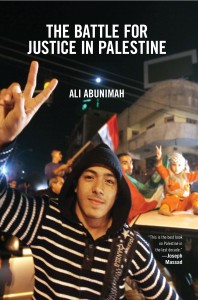
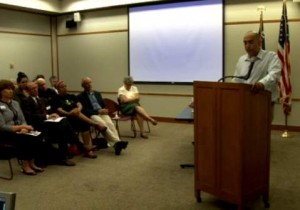
Ali Abunimah On Gaza, His New Book The Battle For Justice in Palestine and Censorship
ElectronicIntifada co-founder Ali Abunimah is the author of new book The Battle For Justice in Palestine. He shares with hosts the recent news of what’s happening in Gaza, the resistance around the world, as well as on campus and in the United States. Ali was scheduled to speak at the Evanston Public Library in early August. The library later sent an email telling him he couldn’t be allowed to speak without an Israeli speaker to ensure balance. Neighbors for Peace an organization of antiwar activists based in the Chicago suburb of Evanston, Illinois who initially brought Abunimah to speak suspected the library’s director was pressured to censor the event. The event was canceled the following day and after some activism and demonstration, the presentation was rescheduled. Ali spoke about his recent book The Battle For Justice In Palestine, the event was packed. Last year at Brooklyn College a similar controversy erupted when Palestinian BDS advocate Omar Barghouti and University of California Berkeley philosopher and BDS supporter Judith Butler we’re scheduled to speak.
Ali Abunimah:
- The situation has gotten considerably worse (in Gaza) over the past year because of the coup in Egypt.
- The current regime in Egypt is very closely aligned with Israel. They’ve made it just impossible for 1.8 million people to live in Gaza.
- The demands from Palestinian civil society is lift the siege, open the crossing, allow farmers to farm, allow fishermen to fish, allow factories to function, allow travelers to travel, students to go to their universities, patients to reach their hospitals, allow medicines to come in, allow books to come in.
- You mentioned my book The Battle for Justice in Palestine. Well, there’s no way to get that book into Gaza.
- It’s also a siege on human contact, culture, education and nourishment. They killed now more than 2000 people in Gaza which is 1 out of every 1000 residents in Gaza.
- Entire families have been wiped out, nobody feels safe. This massacre Israel thought would break people’s will and get them to accept and go back under siege.
- But Israel won’t (lift the siege) it’s a matter of pride for them, it’s a matter of colonial control.
- The most frightening statement about where they’re (Israel) going was made more than 10 years ago. I wrote about this recently in an article called The Gaza Massacre Is The Price of Living In A Jewish State.
- At that time you hearing fantasy about Gaza becoming the new Singapore on the Mediterranean. The Israelis were saying to themselves that Gaza was going to become a giant holding pen for human beings who are not Jewish.
- If we’re going to wait for government to do the right thing or the UN to get its act together, then we’re doomed.
- Despite the multiple levels of complicity by this government in this country, and governments in Europe and the Arab world, something is happening.
- We’re not starting from zero we have a really important and sustained Boycott Divestment and Sanctions movement.
- They’re firing artillery, mortar shells that are designed to be indiscriminate into populated areas of Gaza with the intended consequence of causing widespread destruction.
- We have to go after the weapons manufacturer, we have to after the people who approve these sales from around the world and its because of public pressure that the UK announced last week that they will suspend armed exports to Israel if significant hostilities resume.
- Well now they have resumed, let’s see what they do.
- Look what’s happening just this week, an Israeli cargo ship was prevented from unloading for 4 days in Oakland because solidarity activists and unionized port workers have been working together to prevent that.
- Israel can only maintain its dominance over Palestinians through brute force and use of violence against Palestinians there, and through attempts to suppress debate, suppress political action on behalf of Palestinians in the United States and around the world.
- Mainstream media is more closed to Palestinian voices than what I’ve seen in 20 years. I used to get on CNN, I used to get on MSNBC.
- The librarian let me know that the event was canceled until they could get a pro-Israel speaker.
- There was such an uproar, it was amazing. They did a U-turn pretty quickly.
- As Israel and its apologists lobbies lose control of the narrative, lose control of the politics in this country, there is a more blatant resort to outright repression such as what is going on now at the University of Illinois and other institutions around the country.
- In that chapter I site an organization called the David Project, which is a Zionist group that’s been working for ten years attacking and targeting professors.
Guest – Ali Abunimah, a Palestinian American journalist who has been described as “the leading American proponent of a one-state solution to the Israeli-Palestinian conflict. A resident of Chicago who contributes regularly to such publications as The Chicago Tribune and The Los Angeles Times, he has also served as the Vice-President on the Board of Directors of the Arab American Action Network, is a fellow at the Palestine Center, and is co-founder of The Electronic Intifada.
———
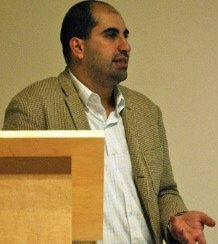
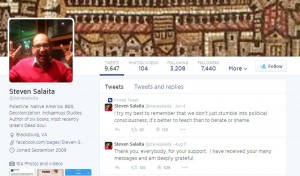
Top Legal Scholars Decry Chilling Effect of Dehiring Professor Steven Salaita
The University of Illinois has rescinded the job offer of the professor who wrote controversial social media posts about the war in Gaza. Professor Steven Salaita was essentially dehired from the American Indian Studies program at the University of Illinois at Urbana-Champaign because of his statements on social media criticizing Israel’s conduct of military operations in Gaza. This has raised serious concerns under established principles of academic freedom. Those principles are enshrined in Illinois law, in the U.S. Constitution, and in the written principles of the American Association of University Professors. Recently, scholars from law schools at Columbia, Cornell, Berkeley, Georgetown, and other universities have come out with a very strong letter condemning the decision of the University of Illinois to dehire Steven Salaita. Read letter here.
Professor Katherine Franke:
- Professor Salaita was made a tenured offer of appointment at the University of Illinois in their American Indian studies program last year. He accepted it and negotiated the terms of the offer. Then during the most recent assault on Gaza, he was active on twitter expressing his views on the Middle East and colonialism.
- The University of Illinois came under a tremendous amount of pressure to revoke the offer of employment to Professor Salaita.
- The offer wasn’t finalized, there’s usually a rubber stamp process where the department and the head of the university have to take appointment to the Board of Trustees.
- The chancellor of the university Phyllis Wise informed Professor Salaita that she would not be bringing his appointment to the Board of Trustees and was unwilling to finalize his appointment.
- He had already resigned his position at Virgina Tech and was getting ready to move. He’s a well known scholar, not only of American Indian studies but of colonialism more generally and has connected up the struggle for sovereignty and analysis of genocide and occupation in the United States to the struggles that the Palestinians have suffered in the Middle East.
- He certainly didn’t depart from views he expressed before but I think they, in the heat of the moment of this recent assault on Gaza, the university basically buckled and withdrew the offer, and he’s now without a job and an income.
- It’s because of his speech on the issue of war crimes that may have been committed by Israel in the assault on Gaza.
- His tweets have been rather even across the board I think in terms of criticizing the critics of Israel when they’ve overstepped but also criticizing Israel itself.
- He’s a fiery guy with strong opinions and rigorous academic critiques of colonialism and colonial violence.
- I thought it would be useful to add constitutional and legal analysis of the problem, situated historically in threats to free speech on campus. I drafted a letter for Constitutional law professors, not in which they would agree to boycott universities . . . more offering a constitutional analysis of retaliation against unpopular speech.
- The law in this area has been made by faculty and sometimes students.
- I brought it back to Urbana-Champaign and their own history of threats to free speech both during the McCarthy period when bills were introduced in Springfield to punish or purge people who had back then what they call Communist sympathies when working in public universities. In 1960, there was a professor in the biology department at Urbana-Champaign that had written and spoke about human sexuality and premarital sex, and had actually endorsed premarital sex.
- There are a couple of principles that are at stake here, one has to do with the state punishing any citizen for speaking on an unpopular topic and particularly punishing for the viewpoint they take.
- There’s another faculty member at the University of Illinois Kerry Nelson who has been a rather enthusiastic advocate of Israel’s right to attack Gaza. He said things that are quite inflammatory, he’s not been fired. He’s not been punished for the positions he’s taken on the Middle East.
- Viewpoint discrimination, that’s the first point. The second point is academic freedom. Universities are the primary bastion of protection. A domain where we protect the pursuit of unpopular ideas, controversial ideas, of ideas that might even be frightening.
- That is the commitment that we make as part of the academic endeavor. The point of that concept of academic freedom is that we don’t want to have a kind of orthodoxy or an official version of the truth.
- Dr. Wise comes out of a somewhat corporate background. She, I think is the poster woman if you will for the executive that is now leading universities and thinks of universities as a business.
- The presidents are making an economic calculation, that they can pay off someone like Salaita and satisfy their donors.
- We can’t just agree to do nothing which what a boycott is. In a way it’s the easiest thing to do.
- I would say I have a lot of faith in students.
Guest – Katherine Franke, Isidor and Seville Sulzbacher Professor of Law; Director, Center for Gender and Sexuality Law at Columbia University. She was awarded a 2011 Guggenheim Fellowship, and is among the nation’s leading scholars in the area of feminism, sexuality and race. In addition to her scholarly writing on sexual harassment, gender equality, sexual rights, and racial history, she writes regularly for a more popular audience in the Gender and Sexuality Law Blog. Franke is also on the Executive Committee for Columbia’s Institute for Research on Women and Gender, and the Center for Palestine Studies and teaches at a medium security women’s prison in Manhattan. Her legal career began as a civil rights lawyer, first specializing in HIV discrimination cases and then race and sex cases more generally. In the last 25 years she has authored briefs in cases addressing HIV discrimination, forced sterilization, same-sex sexual harassment, gender stereotyping, and transgender discrimination in the Supreme Court and other lower courts.
——
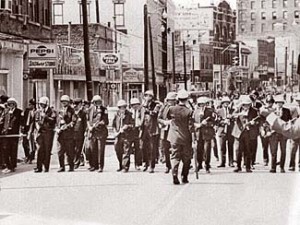
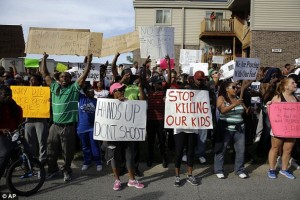
History Of Police Brutality And The Militarization of Local Law Enforcement
In the days since the uproar over the police shooting and killing of unarmed teenager Michael Brown, state and local law enforcement have been cycling through different approaches demonstrators in Ferguson, Missouri. They rolled out armored vehicles, while police in riot gear deployed tear gas, stun grenades and shotguns. Another decision permitted the Missouri State Highway Patrol to march with protestors. The National Guard was also ordered in. We examine the history and consequences of militarizing local law enforcement with Baruch College Civil Rights Professor Clarence Taylor.
Professor Clarence Taylor:
- We can’t talk about a post civil rights era. These issues are still with us today.
- It’s the people on the ground, who have gone through this, that are fed up.
- It’s not just arguing for a black face in a high place.
- There is no requirement of the police of Ferguson to live in that community.
- Having black officers would change the nature of the investigation.
- This is something that’s been argued going back in the 1930s and the 1940s and people were organizing against police brutality.
- We should not take our eyes off the racial component of this.
- Police brutality would still go on without the militarization of the police.
- You throw all these new toys at the police department and once you have a big enough hammer, everything looks like a nail.
- Diversifying police departments is very very important and emphasizing more community policing.
Guest – Professor Clarence Taylor, His research is in modern civil rights, black power movements and African American religion. He’s the author of many books including co-editor of Civil Rights Since 1787: A Reader in the Black Struggle. He’s currently writing a history of police brutality in New York City from the 1930s to the 1960s. In 1991, Clarence received his PhD in American history and began teaching at Le Moyne College in Syracuse, New York. He reworked his dissertation into a book, The Black Churches of Brooklyn from the 19th Century to the Civil Rights Era, and it was published by Columbia University Press in 1994. In 1996, Clarence became a member of the history department and the African-New World Studies Program at Florida International University.
————————————————————
Afghanistan War, CIA Sponsored Terror, Civil Liberties, Criminalizing Dissent, FBI Intrusion, Gaza, Guantanamo, Habeas Corpus, Human Rights, Military Tribunal, NSA Spying, Political Prisoner, Surveillance, Targeting Muslims, Torture, War Resister
Podcast: Play in new window | Download
Updates:
- Attorney Michael Smith Remembers 69th Anniversary of U.S. Dropping A-Bombs On Japan
- Atomic Diplomacy: Hiroshima and Potsdam: The Use of the Atomic Bomb and the American Confrontation with Soviet Power
—–
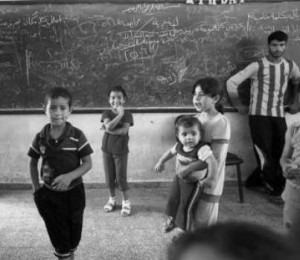
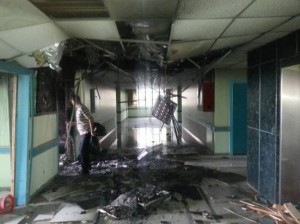
The Logic of Israeli Violence
Ongoing reports of Israel engaging in senseless cruel violence against Palestinian people in Gaza throughout Operation Protective Edge is not a random bombing campaign but a strategic war experiment in colonial management as Greg Shupak explains in his recent article The Logic of Israeli Violence. Shupak points out the attacks on civilians fleeing for shelter, the bombing of the medical infrastructure, fishing boats and wheat mills, killing Arab speaking journalists are in the larger plan of ethnicide and to render the Palestinian people dependent. His article reminds readers that there is a measured plan of attack to systematically erase the historic memory of the Palestinian society.
Greg Shupak:
- There’s good reason to believe according to some reporting by 97 Magazine and Max Blumenthal that the Israeli security forces knew quite perfectly well the teens were almost certainly killed as soon as they were abducted and yet they carried on this charade of pretending that they could be rescued in some way.
- Rocket fire from Hamas didn’t start until after Israel carried out strikes within Gaza, and carrying out various forms of killing Palestinian civilians and or people they described as militants.
- The rockets were a response to Israeli violence.
- Israeli propaganda has insinuated that these tunnels have in fact been used to kill Israeli civilians or that they may well be, but that simply has not happened.
- If the aim was to destroy tunnels, Egypt which is being ruled by a brutal regime, in its own right, was able to get rid of these tunnels without killing huge numbers of civilians.
- Israel’s aim vis a vis Gaza is to isolate Palestinians there from the outside world render them dependent on external benevolence and at the same time absolve Israel of responsibility toward them.
- The thesis I put forth about the current violence of Operation Protective Edge, is that one way Israel is attempting to achieve that goal, that goal of Jewish supremacy in historic Palestine with as much land as possible and as few Palestinians as possible is to aim to obliterate Palestinians as a people with the capacity to live independently in their homeland.
- The pattern of Israeli violence . . . is not only to kill and maim Palestinians but to impede their capacity to live autonomously in historic Palestine.
- It’s a settler colonial project.
- This is part of a longer term pattern. If you look at the work of Dr. Sarah Roy of Harvard she has documented extensively what she calls the deliberate de-development of the Gaza Strip economy. She has warned that Gazans are at risk for mass starvation.
- Five hospitals have been shut down. 24 health facilities have been damaged.
- We also that there’s been direct strikes on hospitals from Israeli fire.
- The ability of Palestinians to care for themselves has very much been undermined.
- Two thirds of Gaza’s wheat mills are inoperative, 3000 of its herders are in need of animal feed. We’ve seen fishermen attacked, we’ve seen attacks on agricultural sites, these are all part of those processes that Sarah Roy has talked about in the longer term.
- If religion is way for a cultural group to understand its identity then attacking the cultural institutions of that religion are ispo facto an attack on the people to have an identity.
- When you attack an educational institution you undermine the ability of a people to educate their young, to train them for future work, to train them to think critically, to develop artists, and inventors and so on.
- This to me is a very significant way for stifling a cultural groups independent existence.
- At its simplest, Israel can be seen as a giant military base for the United States.
Guest – Greg Shupak, a writer, activist and PhD candidate at the University of Guelph’s School of English and Theatre Studies. He teaches Media Studies at the University of Guelph, Ontario, Canada.
——–
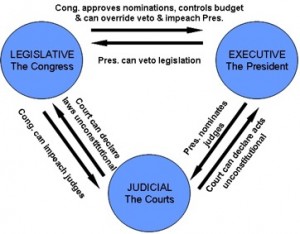
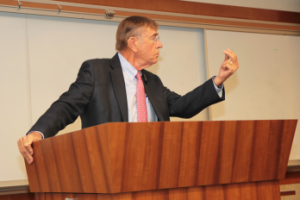
The National Security State: The End of Separation of Powers
Retired Professor of Law from Duke University Michael Tigar joins hosts to talk about his recent article The National Security State: The End of Separation of Powers published in the latest Monthly Review Magazine. Michael has explained how the Executive branch of government has come to dominate both the Judicial and Legislative branches of the United States government. Attorney Michael Tigar has been working on social issues for many years, his books include Law and The Rise of Capitalism, Fighting Injustice, and Thinking About Terrorism: The Threat To Civil Liberties In Times of National Emergency.
Attorney Michael Tigar:
- The basic principle of constitutional government that is established in our Constitution is that the actions of the legislative and executive branches, particularly the executive branch, are always reviewable by independently appointed judges and that the legality of whatever the executive branch does harms any protected interest, citizen or otherwise ought to be reviewable in the courts of the United States.
- The main thing about this is the harm to the judicial branch is in a real sense a self inflicted wound.
- That is to say judges confronted with assertions of executive power have proven inadequate to the task of restraining exercises of executive power
- We recall the massive illegality of the Japanese relocation at the beginning of the Second World War.
- It is now been shown that the premise upon which that relocation took place confining Japanese-Americans in concentration camps was false.
- At the time the Constitution was being debated Patrick Henry opposed the adoption of the Constitution on the ground that the ideal that independent judiciary could act as an effective check upon the exercise of executive power particularly military power was bound to be dis-proven in history.
- Law is legal ideology. That is to say its erected around social relations. In every time of recorded history there is a sense in which the formal guarantees that rules of law make about individual rights are simply lies the regime tells the people in order to sustain itself.
- That was the burden of book I wrote called Law and The Rise of Capitalism.
- The ideal that you rally people to the cause of social change by promising them liberty is also not new.
- The Cherokee people of Georgia read the Constitution and they said Aha, the Constitution guarantees that any group or individual can exercise certain social rights.
- So they drafted a Constitution for their nation and set up institutions then they brought suit against the state of Georgia to enforce these rights, that the letter of the American Constitution guaranteed that.
- What did Chief Justice Marshall say? What a minute, these are inferior and subject people. When the Constitution gives the right to all people, persons, citizens whatever, to bring lawsuits under Article 3 and to bring them to us, it wasn’t talking about these people.
- Michael Ratner you and others, courageous lawyers who have been struggling to get reviewablility of unlawful executive action should not give up the fight.
- The kinds of effort you make deserve support and turn out in historic context to be important.
- Historically the role of lawyers has been to articulate people’s claims for justice.
- What Edward Snowden and Julian Assange have done is reveal to the world fundamental defects in the way that the American political society has been operating and yet rather than saying thank you in some form of another, the government is hell-bent on prosecuting them.
Guest – Michael Tigar, a research professor of law. He holds expertise in Constitutional Law; Supreme Court; French legal system; criminal law and procedure; human rights. He is fluent in French. Tigar represented Terry Nichols in the Oklahoma City bombing trial. One of the most renowned lawyers in the country today, he has argued seven cases before the U.S. Supreme Court and more than 100 appellate cases. Tigar has written extensively about litigation, aspects of trial practice, criminal law, the death penalty, and the role of the criminal defense lawyer. His books include Fighting Injustice (ABA, 2002); Federal Appeals: Jurisdiction and Practice; and Examining Witnesses. In addition, he has written several plays about famous trials. Throughout his career, Tigar has been active in pro bono cases, the American Bar Association, continuing legal education programs, and international human rights. During the apartheid period, he went to South Africa to train black lawyers. Prior to joining AU, Tigar served as a professor at the University of Texas Law School.
—————————————————————————————–

Please help support Law and Disorder, the show is now a sponsored project of Fractured Atlas, a non-profit arts service organization. Contributions for the charitable purposes of Law and Disorder must be made payable to Fractured Atlas only and are tax-deductible to the extent permitted by law.

























